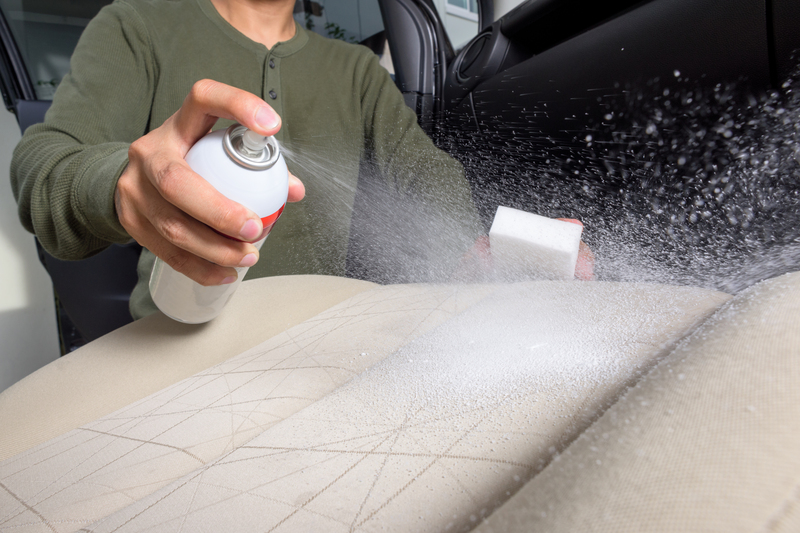Cleaning Supplies: Keys to a Healthy Life
In our daily quest for a healthier lifestyle, we often overlook a crucial element - cleanliness. Maintaining a clean environment is not just about aesthetics; it is fundamental to our health and well-being. This article delves deep into cleaning supplies, their significance, and how they contribute to a healthier life.
The Importance of Cleaning Supplies
Cleaning supplies are essential tools in our fight against dirt, bacteria, and viruses. By using the right products, we can eliminate harmful pathogens that can cause illnesses. Furthermore, a clean environment can enhance mental clarity, reduce stress, and improve overall well-being. Let's explore some key areas where cleaning supplies play a critical role.

Types of Cleaning Supplies
There is a wide range of cleaning supplies available on the market, each designed for specific tasks and surfaces. Here are some of the most common types:
1. Disinfectants
Disinfectants are used to kill microorganisms on surfaces. They are particularly important in areas like kitchens and bathrooms. Examples include bleach, alcohol-based solutions, and hydrogen peroxide.
2. Detergents
Detergents are essential for removing dirt and grease. They are commonly used for washing dishes, clothes, and household surfaces. There are various types of detergents, including liquid, powder, and pod forms.
3. Abrasives
Abrasives are used to scrub surfaces and remove tough stains. They can be in the form of powders or contained within scrub pads. Examples include baking soda and scouring pads.
4. Natural Cleaners
There is a growing trend towards using natural cleaners due to concerns about the environmental impact of chemical-based products. Natural cleaners often use ingredients like vinegar, baking soda, and lemon juice.
Choosing the Right Cleaning Supplies
Selecting the appropriate cleaning supplies for your needs can be overwhelming given the vast array of options available. Here are some tips to help you make informed decisions:
Read Labels
Always read the labels on cleaning products. Look for information on the active ingredients, usage instructions, and safety warnings. This will help you understand the product's effectiveness and potential risks.
Consider Allergies and Sensitivities
If you or a family member has allergies or sensitivities, opt for hypoallergenic or fragrance-free products. These are less likely to cause adverse reactions.
Environmentally Friendly Options
Consider using environmentally friendly cleaning supplies. These products are biodegradable, contain fewer harsh chemicals, and are less harmful to the environment. Look for certifications like EcoLogo or Green Seal to ensure the product meets environmental standards.
Versatility
Choose products that can be used for multiple purposes. Multi-surface cleaners, for instance, can be used on various surfaces, reducing the need for multiple products.
Proper Storage and Handling of Cleaning Supplies
Improper storage and handling of cleaning supplies can lead to accidents and reduce their effectiveness. Here are some guidelines:
Store in a Cool, Dry Place
Most cleaning products should be stored in a cool, dry place away from direct sunlight. This helps maintain their effectiveness and prevents any chemical reactions that could make them unsafe.
Keep Out of Reach of Children and Pets
Always store cleaning supplies out of reach of children and pets. Consider using child-proof locks on cabinets where these products are stored.
Use Original Containers
Keep cleaning products in their original containers. This ensures you have access to important information such as usage instructions and safety warnings.
The Role of Cleaning Supplies in Preventing Illness
Effective use of cleaning supplies is crucial in preventing the spread of infectious diseases. Regular cleaning and disinfecting of high-touch surfaces like doorknobs, light switches, and countertops can significantly reduce the risk of illnesses.
Targeting High-Risk Areas
Focus on cleaning and disinfecting areas that are more likely to harbor pathogens. These include:
- Bathrooms: Toilets, sinks, and showers are breeding grounds for bacteria and mold.
- Kitchens: Countertops, cutting boards, and sinks can be contaminated with foodborne pathogens.
- Common Areas: High-traffic areas such as living rooms and hallways can accumulate dirt and germs.
Regular Cleaning Schedule
Establish a regular cleaning schedule to ensure that all areas of your home are addressed. Daily cleaning tasks might include wiping down countertops and sanitizing high-touch surfaces, while weekly tasks could involve mopping floors and deep-cleaning bathrooms.
Common Myths About Cleaning Supplies
There are several misconceptions about cleaning supplies that can lead to misuse or reduced effectiveness. Let's debunk some of these myths:
Myth 1: More Product Equals Better Cleaning
Using more cleaning product than recommended will not necessarily result in better cleaning. In fact, it can leave residue that attracts dirt and can be harmful to surfaces and your health.
Myth 2: All Disinfectants Work Instantly
Many people believe that disinfectants kill germs instantly. However, most disinfectants need a certain contact time to be effective. Always refer to the product label for the recommended contact time.
Myth 3: Natural Cleaners Are Always Safe
While natural cleaners are generally safer than their chemical counterparts, they can still cause allergic reactions or damage certain surfaces. It's essential to use them as directed and test on a small area first.

Conclusion: Cleaning Supplies as a Cornerstone of Health
Cleaning supplies are indispensable tools that contribute significantly to our health and well-being. By choosing the right products, understanding their proper use, and maintaining a regular cleaning routine, we can create a healthier living environment. A clean home not only looks and smells good but also provides a safe haven free of germs and harmful pathogens.
Investing time and effort into cleanliness is not just a chore; it is a highly effective strategy for enhancing our quality of life. So, next time you pick up a cleaning cloth or disinfectant, remember that you are not just cleaning your home--you are safeguarding your health.
Additional Resources
For more information on cleaning supplies and their safe and effective use, consider exploring the following resources:
By staying informed and making conscious choices, you can ensure that your cleaning practices contribute positively to your health and the environment.



